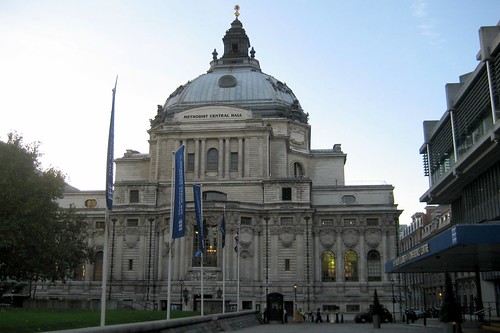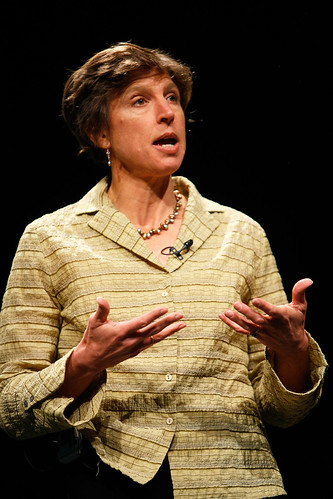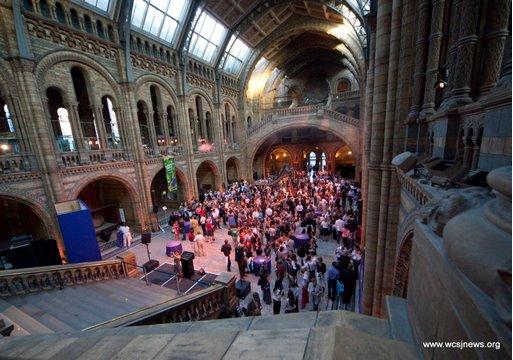
 For me it was a rather new experience to participate in such a crowded conference, where not science, but its reporting, was discussed. I did not know any of the participants beforehand, but got to meet and chat with a dozen or so. All of them were interesting people, but I will mention just two notable examples. They are Simon Singh, the British science writer who was recently caught in a nasty libel cause by the British Chiropractic Association, and Pamela Ronald (left), an eminent professor at the Department of Plant Pathology of UC Davies, who recently published a very successful book, "Tomorrow's Table". Quoting from the description of the book at the link above:
For me it was a rather new experience to participate in such a crowded conference, where not science, but its reporting, was discussed. I did not know any of the participants beforehand, but got to meet and chat with a dozen or so. All of them were interesting people, but I will mention just two notable examples. They are Simon Singh, the British science writer who was recently caught in a nasty libel cause by the British Chiropractic Association, and Pamela Ronald (left), an eminent professor at the Department of Plant Pathology of UC Davies, who recently published a very successful book, "Tomorrow's Table". Quoting from the description of the book at the link above:Written as part memoir, part instruction, and part contemplation, Tomorrow's Table argues that a judicious blend of two important strands of agriculture--genetic engineering and organic farming--is key to helping feed the world's growing population in an ecologically balanced manner. Pamela Ronald, a geneticist, and her husband, Raoul Adamchak, an organic farmer, take the reader inside their lives for roughly a year, allowing us to look over their shoulders so that we can see what geneticists and organic farmers actually do.
 I got to spend some time chatting with Pam during the evening gala at the main hall of London's Natural History Museum (see right), and I made her promise a guest post here on her research and her book -so if you are interested in Prof. Ronald's research, hang around here -but be aware that she is now traveling around, and it might take a while...
I got to spend some time chatting with Pam during the evening gala at the main hall of London's Natural History Museum (see right), and I made her promise a guest post here on her research and her book -so if you are interested in Prof. Ronald's research, hang around here -but be aware that she is now traveling around, and it might take a while...Speaking about venues, it was also quite amazing to have a chance to talk at the Great Hall in the central venue of Westminster Central Hall, during the session called "Blogs, Big Physics, and Breaking News", on July 2nd. The hall can seat up to 2160 people, but there were not more than maybe 120 at our session; nonetheless, it featured a quite interesting discussion between Matthew Chalmers (a freelance science writer), James Gillies (head of Communications at CERN), and myself. Our chair was Matin Durrani, editor at Physics World. Here is how the hall looks like (the picture is from another event -unfortunately I was not smart enough to take one myself):

The theme of the sessionwas the following:
"How are blogs changing the way science news develops and is reported? The commissioning of the Large Hadron Collider at CERN will offer a telling case study over the next few years. Who will be first with news of the fabled Higgs Boson, and how will we know if they're right?"
The session, organized by science writer Jon Turney, included three short talks by the three of us, followed by a panel discussion with the audience.
 First up was Matthew (right), who focused on the process by means of which news appearing in blogs and blog discussions get picked up by science reporters. He made a few examples, pointing out that it is not always the case that what people discusses in the internet -specifically, physics blogs- is worth reporting on science popularization magazines. He seemed to blame the blogs for this, maybe not realizing (but I pointed it out to him and the audience when it was my turn to speak) that it is the journalists' responsibility to decide what is worth reporting on and what is not -the web is a free market where people talk about pretty much what they like to, and indeed not everything is worth headlines.
First up was Matthew (right), who focused on the process by means of which news appearing in blogs and blog discussions get picked up by science reporters. He made a few examples, pointing out that it is not always the case that what people discusses in the internet -specifically, physics blogs- is worth reporting on science popularization magazines. He seemed to blame the blogs for this, maybe not realizing (but I pointed it out to him and the audience when it was my turn to speak) that it is the journalists' responsibility to decide what is worth reporting on and what is not -the web is a free market where people talk about pretty much what they like to, and indeed not everything is worth headlines.After Matthew, it was my turn to talk. I made a few points on the raison d'etre of physics blogs, and on the diffusion of scientific information by particle physics experiments, focusing them on the issue of who will be first to report on the Higgs boson discovery (my bottomline ? It will be "discovered" several times, but the real news will appear first on anonymous comments in blogs!) I will post my own slides in the next post, with some commentary.
 Finally, James Gillies (left) discussed the point of view of CERN, who is actually very active and commendable in its outreach efforts. James made the point that CERN experiments have in certain occasions been disclosing maximally their science, without secrecy or hindrances. He made the example of the almost daily press releases in 2000, when events collected by the LEP II experiments which could represent the first hints of a Standard Model Higgs boson were discussed openly and promptly.
Finally, James Gillies (left) discussed the point of view of CERN, who is actually very active and commendable in its outreach efforts. James made the point that CERN experiments have in certain occasions been disclosing maximally their science, without secrecy or hindrances. He made the example of the almost daily press releases in 2000, when events collected by the LEP II experiments which could represent the first hints of a Standard Model Higgs boson were discussed openly and promptly. There followed a lively discussion with many comments and questions from the audience. I cannot report here the details of the discussion, but one impression I got was the strong concern of science journalists with the loss of readers that their magazines are experiencing due to the increased availability of good to excellent information in the internet, free of charge and often broadcast by the very scientists who do the research. This concern is affecting their judgement, at times making them sour and not always objective. They have the tendency of concentrating on the weak points of blog articles, rather than trying to focus on what they could do to offer something which keeps them in the business. Of course, this is just an impression, and I have to say that while the discussion took place widely in many of the sessions of the whole conference, I did not have a chance to follow much of it, so my impression is probably biased by the turns our session took.
Incidentally, I should also explain why I acted a bit like a tourist at the conference: I had brought with me to London my 10 year old son, Filippo, and the organizers prevented me from taking him with me at the various sessions -I only got permission for the one I was speaking in. I thought this was rather silly, but rather than ignoring their restrictions and sneaking him in I complied, and actually used the fact as an excuse to spend our time in London doing more entertaining things, like visiting Legoland in Windsor... A lot of fun, be advised not to miss it if you visit London with your kids!
 UPDATE: Matin Durrani (right), editor at Physics World , served as convener of our session at WCSJ, and he has a blog post on it here. Unsurprisingly, being a journalist his hunch is more professional than mine at reporting the event, but quite unconventionally, I have more pictures than him in my post :)
UPDATE: Matin Durrani (right), editor at Physics World , served as convener of our session at WCSJ, and he has a blog post on it here. Unsurprisingly, being a journalist his hunch is more professional than mine at reporting the event, but quite unconventionally, I have more pictures than him in my post :) 




Comments